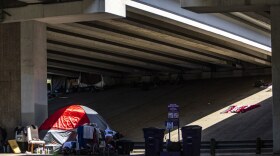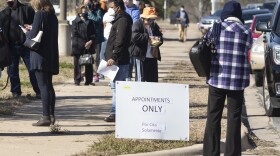In late January, Neffitinni Gutierrez assured her three young sons everything was going to be OK, that she'd see them soon. She hung up the phone knowing those assurances were half-truths.
In recent weeks, things hadn't been OK for her in the Travis County Correctional Complex, where she's awaiting trial for three nonviolent drug offenses and an auto-theft charge.
She'd been given the wrong medicine, causing an adverse reaction that sent her to the ICU at Ascension Seton. She hadn't been given proper medical assistance for her diabetes or her asthma or the two respiratory conditions she suffers from.
She'd already skipped one treatment for those conditions, which require chemotherapy to wipe out precancerous growths in her airway, just above her lungs.
On top of that, there was – and is – the overwhelming fear she could catch COVID-19, which could kill her given her underlying conditions.
As the virus spreads further in Travis County jails, inmates who spoke to KUT said they're being denied medical care, that the number of COVID-positive inmates exceeds the official count, and that they're worried their time in jail could ultimately amount to a death sentence.
'If One Of Us Gets Sick'
Until mid-January, the Travis County Sheriff's Office hadn't reported a single documented case of COVID-19 among its general population at the Travis County Correctional Complex in Del Valle. Since Jan. 11, 142 inmates have tested positive, according to the sheriff's office.
Kristen Dark, a public information officer with the sheriff's office, said Travis County has largely dodged the outbreaks seen in other Texas jails and prisons. While the county is seeing a rise in COVID-positive inmates, it's relatively low, she said, considering the overall population of more than 1,800 inmates.
"We have a very, very low percentage of our general population testing positive, and right now the containment we're doing – and the quarantine we're exercising – is working," she said. "Our goal is to ride this out and keep testing inmates who are in those quarantined housing units until we get negatives across the board and see if we can do what we can to contain this thing and not allow it to move any further."
Still, inmates are concerned about gaps in medical care, access to masks and cleaning supplies, and rules that allow them only 30 minutes a day outside their cells.
Gutierrez said inmates in her pod haven't been given hand sanitizer and that masks aren't handed out consistently. She said that's problematic because many of the women living with her in Building 12 have respiratory issues that put them at high risk for complications from COVID-19.
"I know that it's our right, our civil right, to receive medical care that we deserve and what we need. But they're just not making it a priority for us, and it's really disheartening," she said. "You know ... if one of us gets sick in here ... everybody is going to get sick and – God forbid – a lot of us won't be able to survive that."
One inmate in her pod, Ronnie Martin, told KUT she was denied an inhaler for her COPD.
"When I was in quarantine, I had told them about it. So they requested my medical records from the hospital along with my prescription, and, realistically, they should have kept me in quarantine just because of the fact that [I have] COPD," she said. "They have denied all my medication, and I'm in a dorm with 37 women."
"If someone does end up dying in the care of the county, who's liable for that?"Deniz Kadirhan, defense attorney
In the common area, another inmate – who didn't feel comfortable using her name – said they're sometimes given masks that are the "cheap, disposable ones," but not every day. If an inmate has court or is allowed to leave the pod, she may get an N-95 mask, but there's no guarantee.
The inmate said she's uninsured and doesn't have a prescription for an asthma inhaler. She's been jailed at Del Valle before, when she did have a prescription, so her medical file should reflect that. Still, she said she was denied an inhaler.
Awaiting a parole hearing, the inmate said she hopes to make her daughter's graduation in May. She's frustrated there hasn't been a more concerted effort to release inmates awaiting trial or parole or probation hearings.
"I understand that we put ourselves in here, but they should at least get the ones that are done and over with put out on monitor or something," she said. "We have families that want us to live and want to see us succeed or want to see us out there."
Dark wouldn't address the inmates' specific concerns, but said they should be given inhalers if they have a prescription. "If they do not have a current prescription," she said, "they will be seen by a medical provider who will assess and prescribe as appropriate."

The outbreak in general population started in Building 12 in mid-January. TCSO initially confined all COVID-positive inmates in the jail downtown. With cases rising, it's now moving male inmates who test positive from the general population into Building 3 at Del Valle, while female inmates are still being quarantined downtown.
Since the rise in cases, inmates are locked down almost all day. They're released from their cells for only 30 minutes to shower, make phone calls or stock up at the commissary.
Defense Attorney Deniz Kadirhan said she believes TCSO's protocols have been "subpar" and that she's concerned conditions may worsen even as inmates are kept in isolation or quarantined in COVID-positive units.
"So they are innocent, but maybe having a life – or a death – sentence," she said. "And if someone does end up dying in the care of the county, who's liable for that? Is it the taxpayers that are ultimately going to be liable?"
On top of that, there's no clear sense of when jury trials in Travis County will resume.
'We Don't See The Sunlight.'
William McCurley said he tested positive for COVID-19 on Jan. 19, but he wasn't told until more than a week later. He was moved from general population to a quarantine unit with a roommate, which he said was concerning, given the possibility of spreading the virus.
"I didn't have [symptoms] when I got here. First, it was the migraines ... then I was coughing and then I had the fever and sweats and the sinus congestion. I'm still suffering right now," said McCurley, who's in jail for violating parole. "I'm short of breath. I can't smell anything. I can't taste anything. It's terrifying. It's really terrifying."
"I'm short of breath. I can't smell anything. I can't taste anything. It's terrifying. It's really terrifying."William McCurley, inmate
McCurley said his cellmate also wasn't told he'd tested positive.
"They never told us until today," he said Thursday. "And at no point in time, I promise you – I don't speak lies – I promise you: Not one time did they tell us we had coronavirus. Not one time did they ask us how our symptoms were developing."
Again, Dark wouldn't speak to specifics, but said staff is being urged to "communicate well with inmates."
"I think a lot of the fear and the uncertainty comes from misinformation or from not enough information," she said. "And so, what this week has shown us over and over again is we have some good communication to do. We need to make sure that not only do they understand what we're doing; they understand why we're doing it."
Phillip Jackson and Marquis Collins are cellmates in Building 3, as well. Both told KUT they weren't immediately told they were COVID-positive and that they haven't been given supplies to clean their cell. They said they don't have hand sanitizer or masks, and they're not regularly being let out.
At one point, Collins said, they were confined for 37 straight hours.
"We don't see the sunlight. We don't see the sunlight at all," he said. "We don't smell no fresh air. They keep us in the cell contained where the air is being recycled between all sick people."
Dark said the county's protocols are meant to prevent further spread.
"When they come out of their cells and interact with one another, that's the interaction that's going to potentially expose them to the virus they fear," she said.

Last week, Jackson said he was dismissed by medical staff when he said he wasn't feeling well.
"I told her I was having trouble breathing," he said. "She told me to take some ibuprofen and take short breaths."
Jackson, McCurley and Collins said they've also been fed nothing but peanut butter and jelly sandwiches and "pretzels that are stale as hell," for two weeks.
McCurley said it feels like retaliation for grievances he and other inmates have filed.
"It's nothing but sugar and salt ... with a couple slices of bread," he said. "They've been doing that over here with us for like a week straight. I'm not sure if it's because we're putting grievances in and we're contacting people in the world, but that's all of our diet. And it's gotten people crazy."
"The people that really have power ... they never come to the jail."Marquis Collins, inmate
TCSO had said the kitchen at Del Valle was "at minimal operational status and sandwich meals [were] being distributed to the inmate population," because an inmate working in the kitchen tested positive for COVID-19.
The sheriff's office also insisted its menu was "developed and approved by a licensed dietician" and that it was OK'd by the Texas Commission on Jail Standards.
In multiple conversations with KUT, Collins said the county's public facing messaging as the outbreak has grown hasn't been forthright. He questioned the statement on the food conditions, but also the population of COVID-positive inmates.
He said he doesn't believe TCSO is testing enough inmates, that everyone in his dorm of roughly 100 people was COVID-positive, and that last week's tally of 69 cases painted a rosy picture.
"They are f- - - - - - lying to y'all," he said. "So, this is not people that are saying we have symptoms. No, we all tested positive."
Dark said testing has increased "significantly" since community spread was detected in Del Valle and that testing is "done at the discretion of our physicians and by recommendation by Austin Public Health."
Collins, who's being held on a capital murder charge, said it once took five hours for correctional staff to respond to a call for aid and that he, too, was denied an inhaler for his asthma.
He said he's written about his treatment to Sheriff Sally Hernandez and others, but hasn't gotten a response. It's an outcome he half-expected.
"The Sally Hernandezes and the people that really have power ... they never come to the jail. I've written the NAACP. I've written letters to Sally Hernandez. I've written the chief of the place here, and I got no response from nobody," he said. "So, no matter how many letters we make, they don't write back because in their eyes, we're criminals. So who's going to respond to a criminal?"
Got a tip? Email Andrew Weber at aweber@kut.org. Follow him on Twitter @England_Weber.
If you found the reporting above valuable, please consider making a donation to support it. Your gift pays for everything you find on KUT.org. Thanks for donating today.








